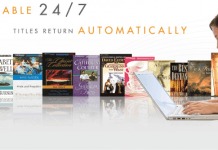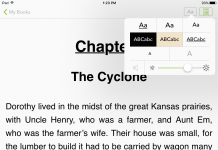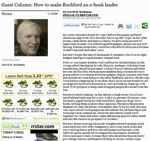
The Rockford (Illinois) Register Star, the local daily, has just published LibraryCity’s guest column: How to Make Rockford an E-Book Leader.
Rockford’s library planners are right that e-books deserve a higher percentage of their budget than now.
But the city should take care to digitize properly before going on a major e-book spree. How about such issues as access for low-income people? Or serious questions about the sustainability of current e-lending models—which a well-stocked national digital library system could help address?
LibraryCity’s article in the Register Star also suggests the creation of an open-membership citizens advisory group. It could offer advice on a number of digitization-related topics.
And maybe on other matters, too? Public libraries, of all institutions, should avoid an old-boy-network approach and secrecy. Kudos to the Register Star and Save Our Rockford Library for caring about both process and substance. Insights from SORL’s Rachel Leon are here. She is not anti-e-book, just worried about the local library spending twenty-five percent of the acquisitions budget on digital media in a city where so many people lack the means to enjoy electronic content at home.
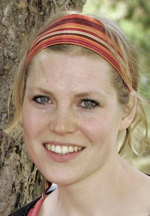
Below are some items of possible interest to Rockford and other cities (beyond LibraryCity’s Chronicle of Higher Education essay and other articles mentioned on the Writings page):
–Low-income people vs. e-books? Illinois controversy shows why the Harvard-based e-library initiative must not downplay nonelite’s needs. Will 50 or 100 loaner Kindle be enough to meet the needs of disadvantaged people? And what about other help? E-books by themselves are hardly a panacea and certainly not a replacement in many cases for face-to-face reference help. Here’s to librarians as social workers! Of course, longer hours for neighborhood branches wouldn’t hurt, either.
–Novel helped young thief turn into a judge: Case history for library system in Rockford, Illionois, to consider in mapping out e-book plans. In a New York Times column, Nicholas Kristof duly praised Judge Olly Neal’s teacher, and ideally he’ll also care about the other half of the equation—the availability of the right books. Mrs. Grady had to drive 70 miles to get them for the future judge, shown below with his Ph.D. daughter. But with e-libraries, K-12 students could start reading life-changing books almost instantly. How to interest them? Just 36 percent of eligible Rockfordians hold library cards, compared to a national average of 68 percent—partly due to the low educational levels that good K-12 and family literacy strategies could help raise. E-books could be a major part of these efforts, particularly since they self-expire, eliminating worries about fines. But this shouldn’t happen without hardware assistance and other support for low-income people, as well as multiuse cost-justification to make these efforts sustainable.
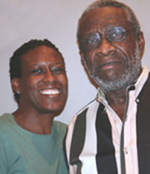
–The nuts and bolts of using tablet computers, e-libraries, and family literacy initiatives to encourage young children to read. “Nearly two-thirds of low-income families in the U.S.,” says Reading Is Fundamental, “own no books.” Paper books could be “gateway drugs” for the potentially more economical electronic variety.
–How a national digital library system could promote early childhood learning—and academic and vocational success later on. Among other things, the posts suggests multiple uses for e-book-friendly tablets—for child-reading, nutrition, health and job-hunting and –training information in both text ad multimedia, for instance.
–Toward an e-library ecosystem: Public libraries will screw themselves if they don’t learn from Amazon’s comprehensive seamless approach. Local issues and national ones are extremely intertwined. Americans in Rockford and elsewhere would be better off with a national digital library system that respected local autonomy but offered libraries far more bargaining power with publishers than they now enjoy; the system would strengthen, not replace, local libraries. Meanwhile here are ten desirable traits for digital items offered through the ecosystem.

–How the state of Kansas dealt with OverDrive, the e-book supplier. This is actually a collection of Google results, not an article. I applaud Kansas for its vigilance, but would earn that libraries must watch out not just for e-books now in their collections but also the legal status of books in the future. Some large publishers no longer even offer e-books for library leading, and at least one, HarperCollins, has a 26-checkout limit on an e-books before libraries must pay more. Unless a national digital library system comes about, just how much leverage will libraries can enjoy in this and other ways. Lawsuits and efforts to change copyright law can go only so far. Of course, given the major differences in the missions of academic and public libraries, we actually need two separate systems even though they should cooperate closely and share resources through a common technical organization and otherwise.
Questions? I’m reachable at davidrothman@pobox.com or 703-370-6540. I am not a librarian but am a former poverty beat reporter who has been writing on digital library issues since the early 1990s. William F. Buckley, Jr., my political opposite, endorsed my basic vision, and I’m waiting for the Obama Administration and the rest of D.C. to catch up—with a well-stocked library system for the whole country, not just the elite. I’ll welcome allies from Rockford. While I’m cheering on Harvard’s Digital Public Library of America initiative and appreciate the inclusion of some public librarians, the upper-level interests of academics and researchers are still prevailing at DPLA over basic library needs of cities like Rockford. Please, DPLA. Get more serious about an OverDrive replacement, hardware-and-connectivity-related alliances, and other access issues, as well as the creation of a robust ecosystem for library content!
”
(Via LibraryCity.)


















